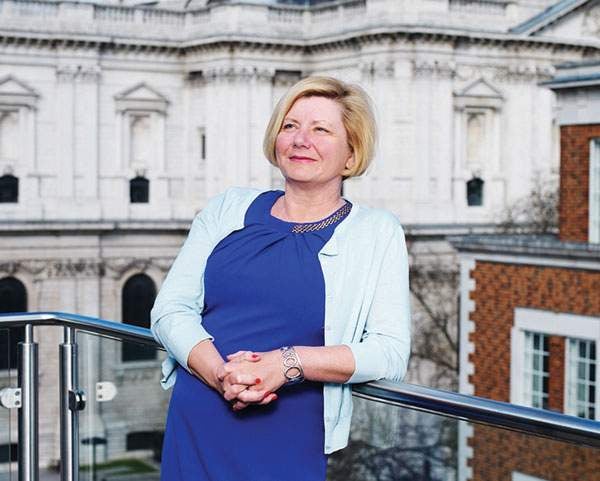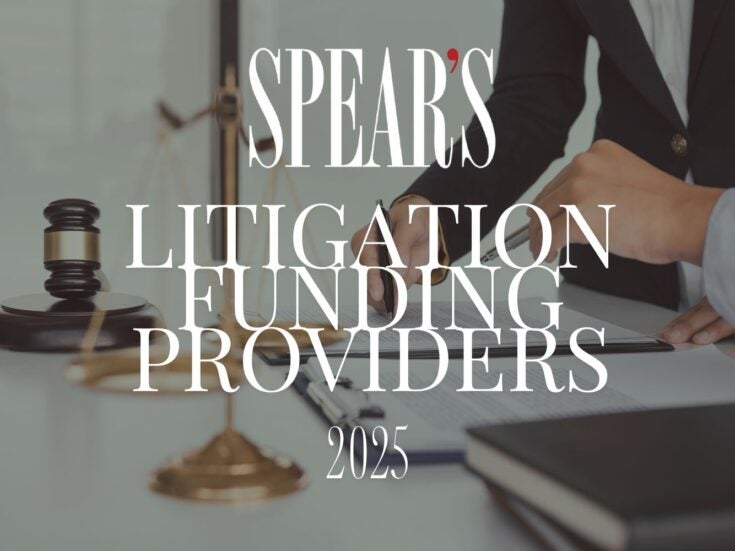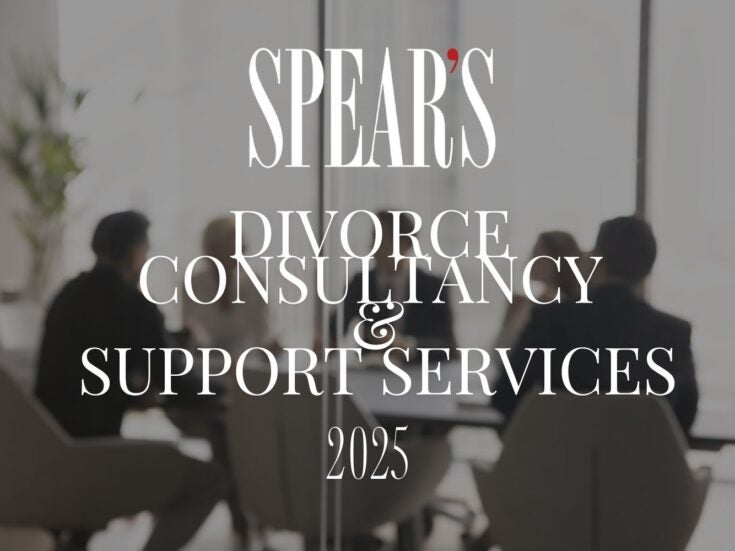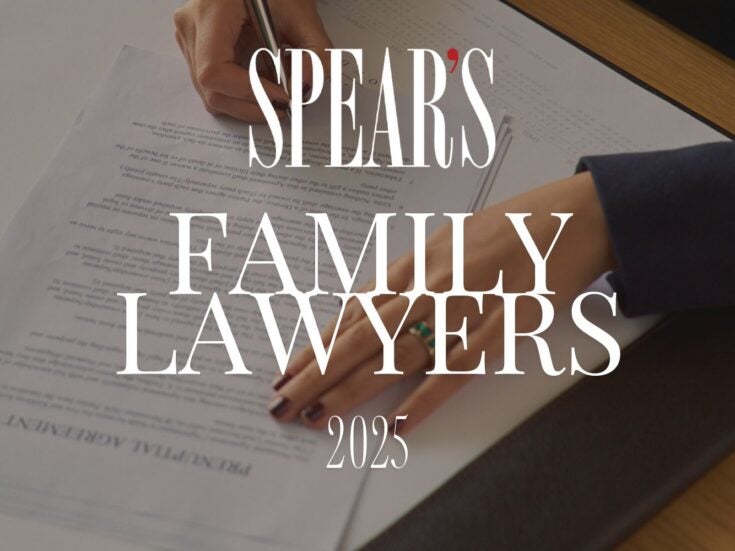
As Neil Sedaka once sang, breaking up is hard to do. But it’s been getting less acrimonious in recent years – at least when it comes to proceedings around divorce in England and Wales.
No-fault divorce was introduced in 2022, which allows couples to separate without having to assert that the other party is at fault. Spear’s research has shown that the move is widely considered to have helped many couples to take the heat out of their split.
Then, in April 2024, changes to the Family Procedure Rules were rolled out to encourage divorcing couples to consider non-court dispute resolution (NCDR), steering cases away from courtrooms toward a faster, less acrimonious and more private process.
And it’s worked. Some data shows that children-related issues and financial dispute resolution (FDR) hearings are increasingly being settled privately; law firm Kingsley Napley reported that 88 per cent of its cases last year involved a private judge – up from 66 per cent in 2023 and just 8 per cent in 2018.
- The best family lawyers for high-net-worth clients
- The best family law barristers for high-net-worth clients
- The best litigation funding providers
A ‘spectrum of options’
This surge is also driven by a broader definition of NCDR since last year’s changes, which now goes beyond mediation to include collaborative law, neutral evaluation by a third-party and arbitration.
‘NCDR is now a spectrum of options, ’says Peter Burgess, the founder of Burgess Mee and an accredited mediator. ‘Clients should really only go to court once they’ve exhausted all the options. ’
The first port of call for many is mediation. As Stephen Burke, chair of the Family Mediation Council (FMC), explains, it is a process where an independent, professionally trained mediator helps the couple work things out together, enabling them to avoid courtroom confrontation and the stress, delay and cost it can bring.
[See also: Family lawyers call for compensation for couples wrongly divorced by computer glitch]
But even mediation can come in ‘lots of different shapes and sizes’, according to Burgess. Hybrid mediation, for example, lets the mediator speak to each party privately if talks stall – offering more flexibility than the traditional model. The process is confidential, with nothing said used in court, and can involve outside experts or even children through child-inclusive sessions.
As the most amicable approach, mediation is often the go-to option for uncomplicated cases. But if that doesn’t work, other, more structured options include collaborative law – where each side works with trained lawyers in joint meetings who agree not to represent the case in court if talks break down – and early neutral evaluation (or private FDR, when it concerns financial matters), where an independent expert offers a non-binding view on likely court outcomes to help guide negotiations.
[See also: The best family lawyers in the UK]
The last NCDR route is arbitration, where couples bring their case before a private judge of their choice who delivers a decision – often the same day – in a confidential, streamlined version of a traditional divorce hearing.
As you might expect, arbitration is often the preferred choice for wealthy couples. ‘You take a process that would otherwise occur in a slightly grotty court building somewhere outside London, and take that model to a private setting in a much nicer room, with a judge of your choice, who has the time and expertise for your specific case, ’Burgess explains.
[The ‘Queen Bees’ of family law: long may they reign?]
Suzanne Kingston of Penningtons Manches Cooper, who has been dubbed ‘the queen of mediation and arbitration ’for spearheading the Family Law Arbitration Scheme in England and Wales, tells Spear’s that for (U)HNWs and their families, avoiding a ‘public decision being imposed upon them by the court ’offers greater autonomy and a significantly faster resolution – sometimes within weeks rather than the 18-month wait typical of court. There’s also less stress, along with the opportunity to model a calmer, more constructive approach for their children.
Furthermore, some of the advantages of private FDRs and arbitration are particularly appealing to the rich and famous.
Since January 2024, new transparency measures have allowed journalists access to private family court hearings, potentially putting high-value divorces in the public eye. ‘High-money and high-profile cases are under more scrutiny than ever before, so being able to resolve them away from the public is a really attractive opportunity, ’says Burgess.

The ability to select a judge is also helpful. ‘Clients are going to pick a judge who they know is familiar with their issues, instead of rolling the dice on a public court judge who might be having an off day or lack expertise,’ Burgess explains. He adds that this process also eliminates unpredictable ‘maverick ’outcomes, resulting in a significantly higher success rate for private FDRs compared to other forms of litigation.
For him, the ‘beauty of NCDR ’is the chance to ‘create a bespoke ecosystem of experts and services for clients’, essentially ‘assembling an A-team around them who have the right expertise to make a difficult process less horrific’.
Natural limits of non-court dispute resolution
Yet, however ‘beautiful’ NCDR can be, it’s not always the right fit. While Burgess predicts an ‘expansion of mediation to include more complicated, high-money cases, ’it could push NCDR beyond its natural limits when it comes to handling more complex disputes.
[UHNW women among economic abuse victims being failed by courts, family lawyers warn]
Simon Beccle, a partner at Payne Hicks Beach with experience in family law cases heard in the Supreme Court, tells Spear’s: ‘The problem with NCDR is that if a client refuses to cooperate, there’s no one to compel them. ’In fact, outside of a courtroom, lawyers lack the authority to force disclosure or require expert valuations on assets, which can lead to inequalities in terms of bargaining power.
‘Outside of court, judges deal with cases on a snapshot of information without necessarily testing the evidence,’ Beccle says. ‘If one party is a savvy, successful [businessperson] and the other isn’t, there’s a risk the more experienced partner may withhold information and pressure their less savvy spouse into a deal. In such cases, mediation simply doesn’t work.’
Choosing the NCDR route is therefore a gamble that largely depends on the solicitor’s judgement. ‘It comes down to experience,’ Beccle says, ‘but if complex cases are in the court system it is for a good reason.’

One unintended consequence of the push to NCDR, reckons Beccle’s colleague (and new head of Payne Hicks Beach’s family department) Nick Manners, is that the reduction in court hearings and attendant lack of new precedent could prevent the law from keeping up with changes in society – and in the lives and relationships of the people it is supposed to be serving.
[See also: Sir Nicholas Mostyn, ex-judge and family law legend, on his next chapter]
For Kingston, however, even some complex cases can lend themselves well to hybrid mediation. ‘It is a real alternative to courts, because you have lawyers giving legal advice on the spot, ’she says. ‘I recently worked on a very complicated divorce case between two HNWs, where we involved their accountants and other financial experts, and could resolve everything in just two days.’
Research undertaken by the FMC in January shows that while two-thirds of people are aware that mediation can be a quicker and easier alternative to court, that awareness ‘is yet to switch into action’, Burke says. He adds: ‘The FMC’s goal is to now ensure that growing awareness means that divorcing and separating couples take action, knocking on a family mediator’s door first.’
Kingston sees that shift coming very soon. ‘It used to be called alternative dispute resolution. But it is on track to become extremely mainstream.’
This article first appeared in Spear’s Magazine Issue 96. Click here to subscribe







